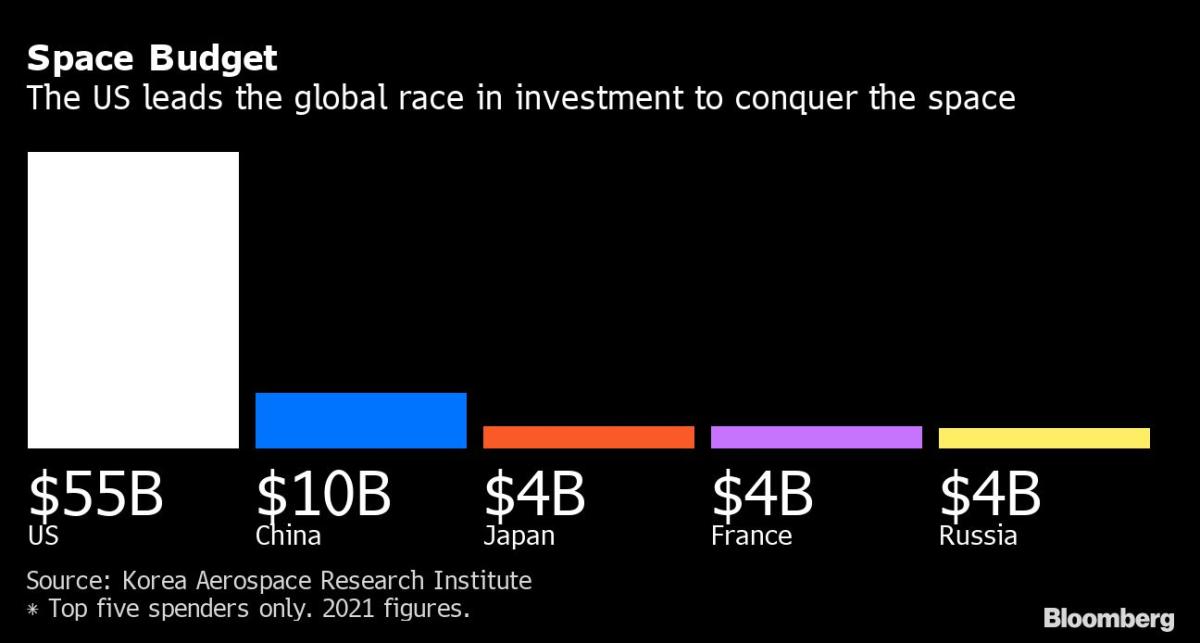(Bloomberg) — South Korea is preparing a domestic missile development program as part of an ambitious effort to carve out a larger chunk of the global space economy following the implosion of its partnership with Russia.
Most read by Bloomberg
Seoul last month revoked a contract with Moscow in favor of a European operator to launch a satellite into space. After years of relying on Russia to send its probes into orbit, the move is a noticeable effect of sanctions on the Kremlin for its invasion of Ukraine.
“Our plans to launch a multi-purpose satellite with Russia went horribly wrong,” Korean Deputy Science Minister Oh Tae-Seog said in an interview. “From a space industry perspective, but also from a national security perspective, it’s important to have the ability to launch a satellite that we want, whenever we want.”
South Korea’s separation from Moscow will deal a severe blow to Russia’s missile program, one of the country’s strongest post-Soviet industries outside of oil, and underscores the impact of international pressure. Space is also a natural next step for South Korea’s sophisticated economy, led by its high-tech -Sector.
“Even when the war is over, it won’t go back to the old days,” said Lee Changjin, a professor of aerospace engineering at Konkuk University in Seoul. “I’m sure Moscow will try to re-enter the market after the war ends, as its large space industry cannot be sustained with domestic demand alone.”
South Korea paid Russia about 28.7 billion won ($22 million) of the 59.3 billion won planned under the canceled deal, according to Legislative Park Wan-joo’s office.
It will probably be too late to win back Seoul as a customer once Russia ends the war and sanctions are eased. South Korea launched its first domestically built rocket in June, which successfully put a test satellite into orbit, and is reviewing a next-generation vehicle that could carry heavier and more complex satellites without foreign assistance.
The sense of urgency to possess a wider range of space capabilities is also increasing after President Yoon Suk Yeol recently announced plans to land a spacecraft on the moon by 2032 and on Mars by 2045. That comes after a similar promise by the US and China’s lunar plans.
There is also a business goal: to increase South Korea’s share of the global space economy from the current estimated 1% to 10% by 2045. That would require building an ecosystem of space developers, ranging from startups to larger companies with industrial clusters spread across the country, Oh said.
But South Korea is catching up in the missile business, where it competes with similar programs in Russia and the US, which have been putting satellites into orbit for more than half a century. Neighbors China and Japan have far more experience, and North Korea has sent missiles further into space than South Korea has its latest homemade missile.
In South Korea, the number of jobs in the space industry has steadily increased from 6,708 in 2017 to 7,317 in 2021. The government plans to double its annual R&D investment to 1.5 trillion won by 2027 to further boost the sector, which is currently estimated to be worth $2.3 billion.
In comparison, Morgan Stanley estimates that the global space industry generates revenues of around US$350 billion and could potentially exceed US$1 trillion by 2040. Satellite broadband will likely account for half of projected growth, it says.
According to the Ministry of Science, Korea’s main investment areas will include satellite data, navigation, medicine, energy and space-related resources.
“The path for our companies might be different than the path for global companies like SpaceX,” Oh said, referring to Elon Musk’s group. South Korea can differentiate itself by helping companies find cheaper ways to launch high-power satellites into low orbit, he said.
The global revival of space enthusiasm comes after the US launched the Artemis program in 2017 to take astronauts to the moon and eventually reach Mars. It has attracted partnerships from more than 20 nations including South Korea.
China, with the second-biggest funding for space development, is also accelerating efforts to put humans back on the moon and secure access to its resources. Both superpowers are spending billions of dollars as their rivalry moves beyond Earth. For South Korea, the US – its most important ally – is its most important space partner.
“The US is the one we have the most important and active talks with,” Oh said. South Korea sees more concrete talks between the two countries on opportunities for cooperation in the space industry and exploration after their presidents agreed last year, he said.
South Korea is not currently considering cooperation with China, he said. Still, it is expanding ties with others including Australia and the United Arab Emirates, a country Yoon visited in January, he said.
While ruling out the development of missiles for military use, Oh said Korean launchers are vital to being able to monitor threats that could come from space.
In the latest case of outer space hazards, remnants of a massive Chinese missile crashed over the Indian Ocean in July, sparking safety concerns.
“The space industry is growing at an explosive pace, so from an industrial perspective, we can’t ignore it,” Oh said.
“It’s also important for national security as competition for a share of space between nations intensifies.”
–Assisted by Sangmi Cha, Stephen Engle, Adrian Wong and Andy Hung.
Most Read by Bloomberg Businessweek
©2023 Bloomberg LP
Don’t miss interesting posts on Famousbio









